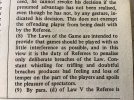I don’t know about England, but in the US the concept continued to be taught as part of understanding the spirit of the gme needed to apply the Laws the way Game intended. USSF’s Advice to Referees quoted the passage in full, explaining that it was an integral part of understanding the spirit of the game.
I have to say, I didn't like everything about the USSF's Advice to Referees - it was very much of a curate's egg, for me.
However this was one of the parts that I thought was OK. After quoting the IFAB decision, it went on as follows:
"This former International F.A. Board Decision (previously included in Law 5 as Decision 8) was removed from the Law only because it was felt to be an unnecessary reminder of the referee's fundamental duty to penalize only those violations that matter. The spirit, if not the words, of this Decision remains at the heart of the Law. It is applicable to all possible violations of any of the Laws of the Game.
A trifling infraction is one which, though still an offense, has no significant impact upon play. A doubtful offense is one which neither the referee nor the other officials can attest to.
Under no circumstances should the advantage clause be invoked for such “offenses.” The referee’s decision as to whether a player’s action is trifling or not is affected considerably by the skill level of the players.
However, the referee should remember to consider trifling offenses in determining persistent infringement of the Laws.
Further the referee may wish to talk to or warn, a player regarding trifling infringements which, though considered trifling, may nonetheless lead to frustration and retaliation if they continue."



